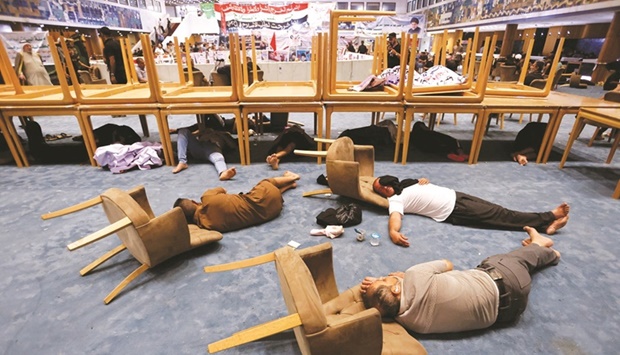Iraqi populist cleric Moqtada al-Sadr yesterday told his supporters to continue their sit-in occupation of the Baghdad parliament until his demands, which include early elections and unspecified constitutional changes, are met.
The remarks, delivered by the leader in a televised address, are likely to prolong a political deadlock that has kept Iraq without an elected government for nearly 10 months.
Thousands of Sadr’s followers stormed Baghdad’s fortified Green Zone, which houses government buildings and foreign missions, last weekend and took over the empty parliament building staging a sit-in that is ongoing. The moves were a response to attempts by his rivals, many of whom are close to Iran, to form a government with prime ministerial candidates that Sadr disapproves of.
Sadr won the largest number of seats in parliament in an October election but failed to form a government. He withdrew his lawmakers from parliament and has instead applied pressure through protests and the parliament sit-in, drawing on his popular base of millions of working-class people.
Sadr reiterated during his address that he was ready to “be martyred” for his cause. “Dissolve parliament and hold early elections,” Sadr said.
The deadlock between Sadr and his rivals has left Iraq without a government for a record time in the post-Saddam Hussein era. The United Nations mission in Iraq called on leaders to put their country first and end a long-running political power struggle, as tensions soar in the war-scarred nation.
Nearly 10 months on from elections, the oil-rich country still has no government and no new prime minister or president. “We appeal to all actors to commit, actively engage and agree on solutions without delay”, the United Nations Assistance Mission for Iraq (UNAMI) said in a statement. “Leaders must prioritise (the) national interest,” it said.
Yesterday, followers of the powerful preacher and political kingmaker Moqtada Sadr continued a mass sit-in at parliament for a fifth day. The Sadr bloc opposes a nomination for prime minister by the Co-ordination Framework. Outgoing prime minister Mustafa al-Kadhemi has called for a “national dialogue” in a bid to bring all sides together to talk, and yesterday spoke with President Barham Saleh.
Both men stressed the importance of “guaranteeing security and stability” in the country, according to the Iraqi News Agency.
“Meaningful dialogue among all Iraqi parties is now more urgent than ever, as recent events have demonstrated the rapid risk of escalation in this tense political climate,” the UN mission warned. On Tuesday, a top Sadrist official gave followers 72 hours to shift their protests from the main meeting halls of parliament to the entrance of the building and a surrounding encampment.

Supporters of Iraqi populist leader Moqtada al-Sadr sleep during a sit-in at the parliament building, amid political crisis in Baghdad, Iraq.
